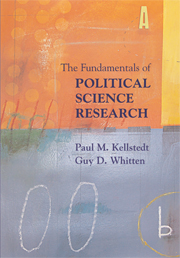Book contents
- Frontmatter
- Contents
- Figures
- Tables
- Acknowledgments
- THE FUNDAMENTALS OF POLITICAL SCIENCE RESEARCH
- 1 The Scientific Study of Politics
- 2 The Art of Theory Building
- 3 Evaluating Causal Relationships
- 4 Research Design
- 5 Measurement
- 6 Descriptive Statistics and Graphs
- 7 Statistical Inference
- 8 Bivariate Hypothesis Testing
- 9 Bivariate Regression Models
- 10 Multiple Regression Models I: The Basics
- 11 Multiple Regression Models II: Crucial Extensions
- 12 Multiple Regression Models III: Applications
- Appendix A Critical Values of χ2
- Appendix B Critical Values of t
- Appendix C The Λ Link Function for BNL Models
- Appendix D The Φ Link Function for BNP Models
- Bibliography
- Index
1 - The Scientific Study of Politics
- Frontmatter
- Contents
- Figures
- Tables
- Acknowledgments
- THE FUNDAMENTALS OF POLITICAL SCIENCE RESEARCH
- 1 The Scientific Study of Politics
- 2 The Art of Theory Building
- 3 Evaluating Causal Relationships
- 4 Research Design
- 5 Measurement
- 6 Descriptive Statistics and Graphs
- 7 Statistical Inference
- 8 Bivariate Hypothesis Testing
- 9 Bivariate Regression Models
- 10 Multiple Regression Models I: The Basics
- 11 Multiple Regression Models II: Crucial Extensions
- 12 Multiple Regression Models III: Applications
- Appendix A Critical Values of χ2
- Appendix B Critical Values of t
- Appendix C The Λ Link Function for BNL Models
- Appendix D The Φ Link Function for BNP Models
- Bibliography
- Index
Summary
OVERVIEW
Most political science students are interested in the substance of politics and not in its methodology. We begin with a discussion of the goals of this book and why a scientific approach to the study of politics is more interesting and desirable than a “just-the-facts” approach. In this chapter we provide an overview of what it means to study politics scientifically. We begin with an introduction to how we move from causal theories to scientific knowledge, and a key part of this process is thinking about the world in terms of models in which the concepts of interest become variables that are causally linked together by theories. We then introduce the goals and standards of political science research that will be our rules of the road to keep in mind throughout this book. The chapter concludes with a brief overview of the structure of this book.
Doubt is the beginning, not the end, of wisdom.
– Chinese proverbPOLITICAL SCIENCE?
“Which party do you support?” “When are you going to run for office?” These are questions that students often hear after announcing that they are taking courses in political science. Although many political scientists are avid partisans, and some political scientists have even run for elected offices or have advised elected officials, for the most part this is not the focus of modern political science. Instead, political science is about the scientific study of political phenomena.
- Type
- Chapter
- Information
- The Fundamentals of Political Science Research , pp. 1 - 21Publisher: Cambridge University PressPrint publication year: 2008



